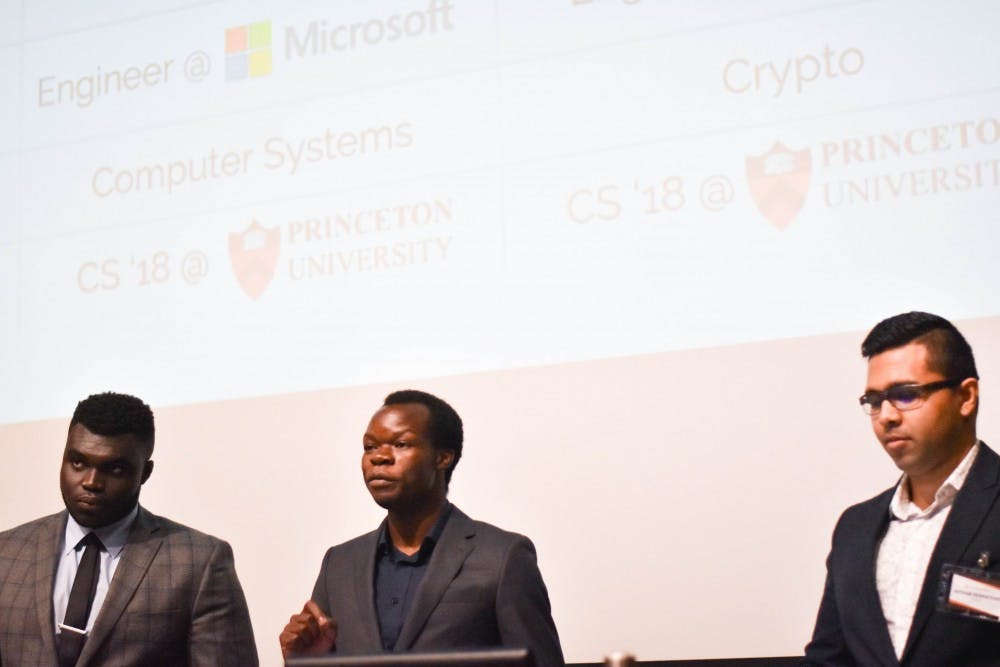A team of computer science majors and entrepreneurs from the University are the winners of the TigerLaunch competition, the nation’s largest student-run entrepreneurship competition.
The team of Felix Madutsa ’18, Avthar Sewrathan ’18, and Richard Adjei ’18 are the founders of the company BlockX, whose primary product is Afari, a decentralized social network meant to protect users’ data and information and maintain privacy by using technology called blockchain.
“At BlockX, we believe that users should be able to control their digital property in the same way they control their physical property,” said Madutsa. “Currently, Afari supports a microblogging functionality that can be used in the same way that you use Twitter.”
The team said that their new social media platform could gain traction by appealing to free speech activists, and that it could eventually draw content creators. Drawing content creators, the team argued, would bring those creators' followers to BlockX, allowing the platform to gain even more traction. During their pitch, the team referenced the recent Cambridge Analytica scandal as a primary example of why the world needs a decentralized platform for users, content creators, and others.
“The world realized that social media as it stands is broken,” said Sewrathan. “This is because social media companies like Facebook and Twitter are centralized: they own our data, they store it in their servers, and they control who accesses it.”
The BlockX team will be awarded $15,000 in prize money and an opportunity to pitch to top venture capital firms. $10,000 will be awarded to the second place team and $5,000 to the third place team.
Not only did the BlockX team win the formal competition, but they also won the Audience Choice Award, which was voted on by the larger community online.
“We were also surprised by the amount of support we got from the community,” said Madutsa. “It was a very humbling experience.”

Sewrathan echoed the sentiment, expressing gratitude to both his teammates’ hard work and all the hard work on the part of the Princeton Entrepreneurship Club and the Keller Center, who helped sponsor and run the competition.
“We are very surprised and very grateful that we could come first out of all those wonderful teams. Any one of those teams could’ve come in the top three,” said Sewrathan. “We’re grateful our hard work paid off.”
Moving forward, BlockX will be working in Princeton’s E-Lab over the summer, and is also preparing for two further competitions later this year.
The competition was hosted on-campus in the Frist Campus Center and Frick Chemistry Laboratory. On Saturday, April 14, BlockX and winning teams from the Seattle, New York, Chicago, and Paris semi-finals pitched ideas to a panel of judges, attempting to show their products' worth and potential.


“Being a founder and getting involved with early-stage startups is not really about an innate talent; it’s about really wanting to do it and feeling comfortable doing it,” said Amit Mukherjee ’10, one of the judges of the competition and a partner with the venture capital firm NEA. “It’s about their willingness to take risks at the early stages of their career.”
The judges were not only looking at each competitor's product, but also the competitors themselves — seeing the time and energy they put into their work and if they had the capacity to push their product forward.
“It’s all about the founder at the early stage: the founder’s ability to pivot, his tenacity, his grit, that’s what it’s all about,” said Doc Parghi, another judge and a partner at SRI Capital. “We’ve passed on deals where it was a very interesting technology, seemed to be a strong product-market fit, but the founder was just not somebody we thought had the will to succeed.”
Parghi’s comments were reiterated by a fellow judge. “In early stage investing, in my perspective, it’s 95 percent the founder, 5 percent the product,” said Trip Jones, a general partner with August Capital. “If you have the right founder, I don’t even care what the product is; you can fund the company before the company exists.”
The second place winner was the team behind Food Period, a company devoted to making food products that naturally assist with menstrual cycles, and the third place winner was Retinox Medical, whose team created a contact lens that helped reduce the chance of blindness caused by diabetes.

Other competitors pitched products ranging in areas from orthodontics to virtual reality.
The TigerLaunch event also featured a judges’ panel at the beginning of the day, as well as a keynote speech from Cindy Healy, director of business operations at Microsoft. During her speech, Healy reiterated the importance of risk-taking and innovation in business and in attaining success as a whole.
“The real risk is doing nothing,” said Healy.
Healy spoke about her many life experiences, including her work on the Mars Pathfinder mission with the Jet Propulsion Laboratory, her career at Microsoft, and her success in winning the Circle of Excellence Award, Microsoft’s highest award, in 2016. She said that the keys to success were recognizing one’s potential, owning that potential, setting a new course, and envisioning success.
“Envision success. Go there, see it, smell it, taste it,” said Healy. “I use this method over and over again.”
A previous version of this article misstated the allocation of the prize money among the winners of the competition. The ‘Prince’ regrets the error.








